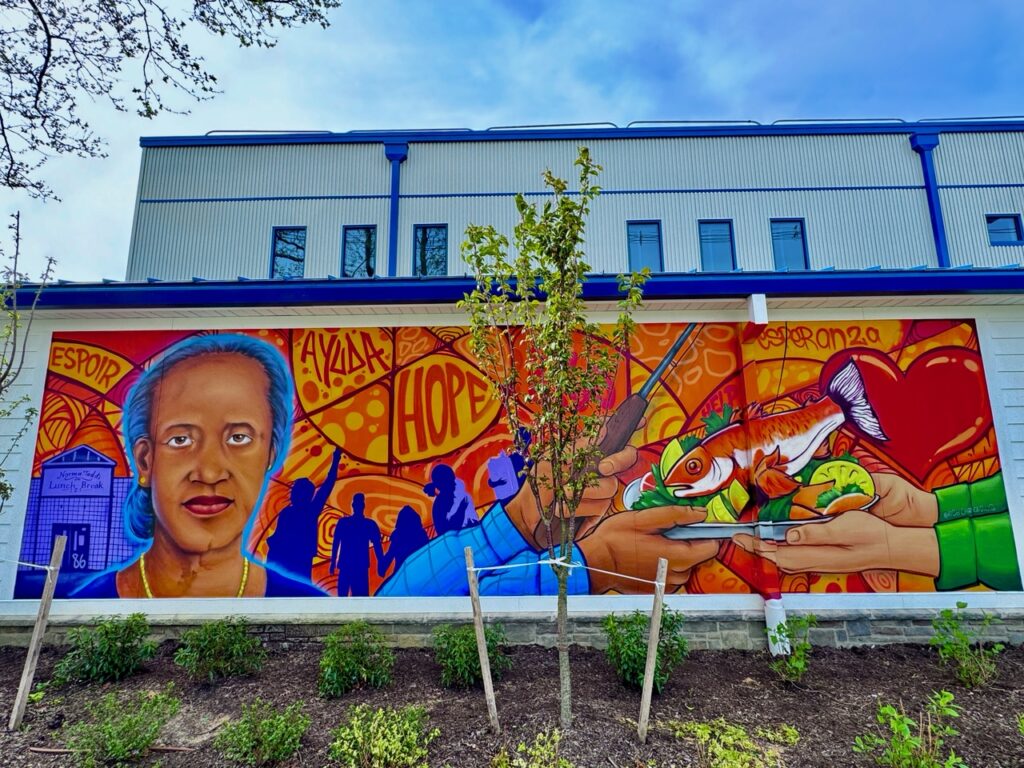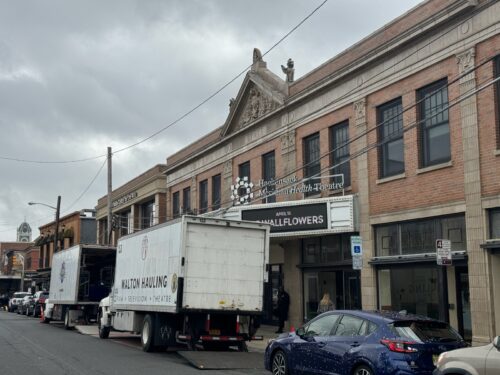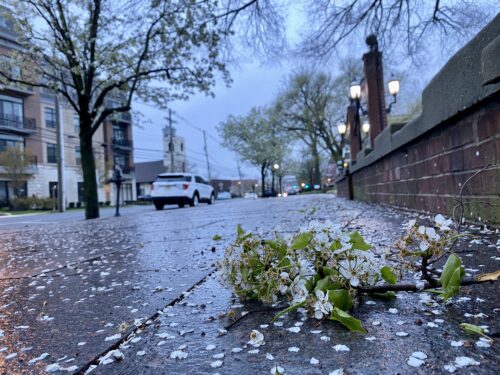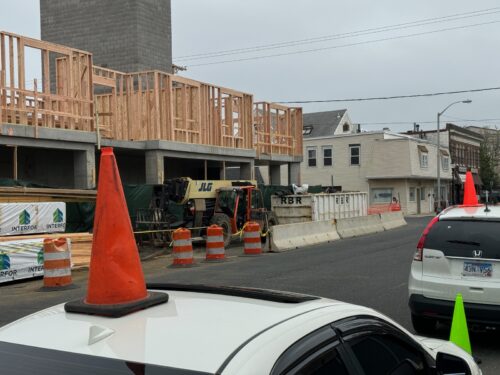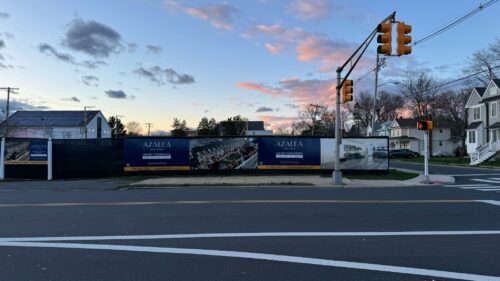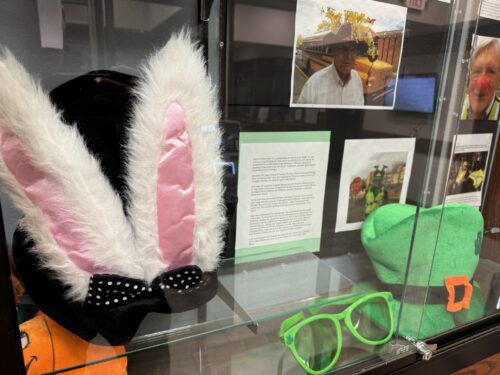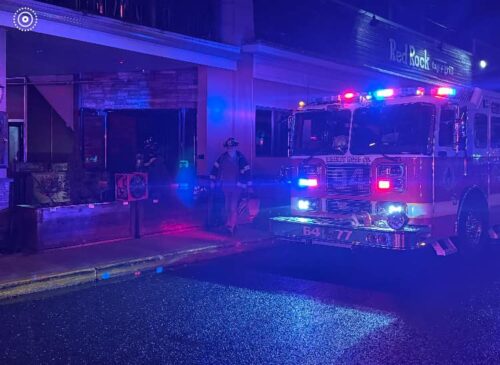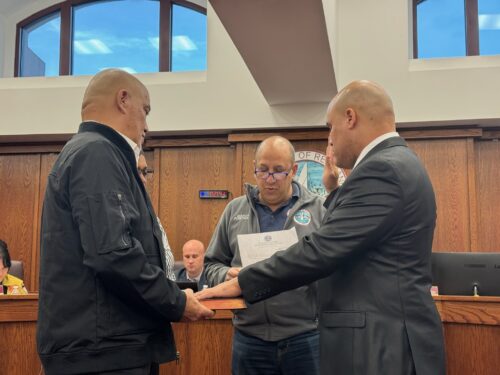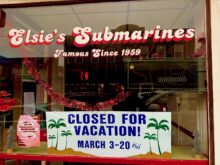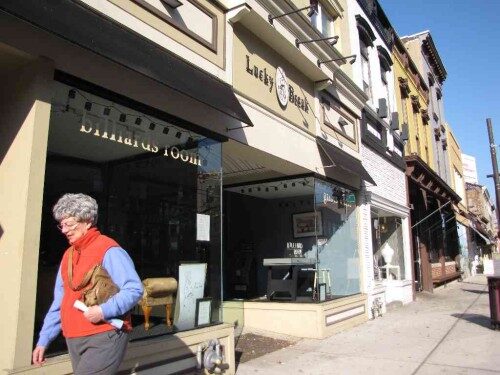
By JOHN T. WARD

• In early 2011, in an effort to spice up nightlife, Red Bank Mayor Pasquale Menna spearheads a zoning law change to allow billiards parlors and other entertainment-based businesses to operate downtown.
• Several months later, former Mayor Ed McKenna, as lawyer on a lease for a planned billiards parlor, calls now-deceased police Chief Steve McCarthy to confirm that it could operate as a bring-your-own-beer and wine establishment. McKenna gets an OK, he tells his client, James Hertler, who was in McKenna’s office during the call.
• That October, Hertler goes before the zoning board and wins quick, unanimous approval of his plan for Lucky Break Billiards. Throughout its lengthy resolution of approval, the board notes that Lucky Break will be a BYOB that serves coffee and microwavable snacks and will allow its customers to bring in food from nearby restaurants.
• The following March, Hertler and partner Jeff Regen open Lucky Break at 14 West Front Street, in a space that had been vacant for four years.
• Lucky Break toughs it out for the next 18 months, building a repeat clientele largely based on private parties and edging toward profitability.
• Though it’s located amid a busy cluster of bars, there’s not a single incident requiring a police response at Lucky Break. “We worked hard to be a good neighbor,” said Hertler, a borough resident.
Yet without any change in the pattern described above, guess who abruptly finds himself accused of violating liquor laws – and out of business?
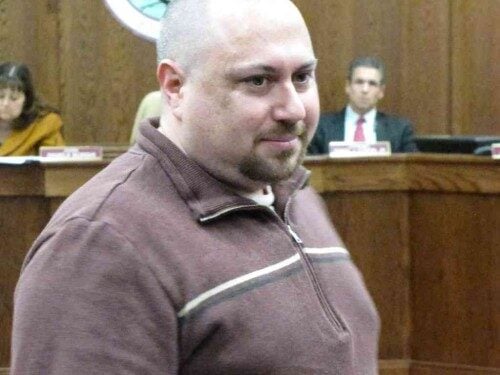
The bullet point missing from the above string:
• On Friday, August 30 of this year, police busted up a private party at Lucky Break, telling patrons to dump their open bottles of wine and beer. They also put the manager on notice that the business was in violation of state law. No summons was issued.
Hertler, who was not present that night, was stunned and confused when he learned what had happened, he told redbankgreen. But he had to wait until after the Labor Day weekend before he could begin to unravel what had happened, and why.
The ‘what’ was clear enough: in the eyes of the borough, Lucky Break was in violation of state BYOB laws, an assertion Hertler denies. But three months later, he still doesn’t know why he was targeted for doing something he told the town he was going to do, had won approval to do, and had been doing for a year and a half.
Even more frustrating, he said, is that he cannot get a toehold on how to correct the situation from town officials who once rolled out the red carpet.
“What’s changed since we opened?” Hertler asked Menna and the borough council Monday night, during an exchange that went on for 35 minutes. “Whatever laws are being enforced now were in place when I opened.”
The impetus for the police action is a matter of dispute. Menna told redbankgreen earlier this month that police had been alerted “by the director of the [state Alcoholic Beverage Control]” agency – former Fair Haven Mayor Mike Halfacre – to take action against Lucky Break for customer drinking. That assertion was repeated by Menna and other officials at Monday night’s meeting of the borough council, where Hertler pleaded his case for help.
Captain Darren McConnell, the officer in charge of the police department, said previously that it was also his understanding that the complaint originated with Halfacre, who “noticed something” as he passed the billiards parlor and alerted local authorities.
Not so, said Halfacre. He told redbankgreen that the complaint did not come from him, nor, as far as he could determine, was it made by any of the ABC’s 18 enforcement inspectors.
“There’s no record of it here,” Halfacre said.
In fact, he said, the ABC, has “no jurisdiction” over BYOB matters, because its authority is over licensed establishments. BYOB issues, he said, are strictly matters of local enforcement of ordinances.
Asked about the discrepancy after Monday night’s meeting, Menna said he had been told by police that the matter originated with the ABC, but that he had no independent corroboration of that. But he said that it didn’t matter where the issue arose. “It could have come from a private citizen,” and the police would still have acted as they did, he said.
In fact, Lucky Break wasn’t the only business affected by the crackdown, it turns out. Yestercades, a video game parlor on Broad Street that was approved by the zoning board two months before Lucky Break – also after open discussion that customers would bring in their own beer and wine – was visited by cops in recent months and told that its practice of allowing BYOB parties violated the law, owner Ken Kalada told redbankgreen.
Even though the parties were limited to a back room not open to the general public, in apparent compliance with state statute, “they still wouldn’t let us do it,” Kalada said.
Kalada said he was too busy opening a second Yestercades, in Somerville, to argue with with borough, and said the financial fallout from the loss of BYOB parties “is not that big a deal.” He’s also relieved not to be in potential legal jeopardy should one of his BYOB customers continue drinking elsewhere and get into an auto accident, he admits.
Still, the borough’s sudden reversal “bothers me, because we kept it well-controlled,” he said.
Hertler said he isn’t hung up on what triggered the police action. But the impact was swift.
As word of the ban on BYOB activity spread among clients who had booked bachelor parties and 40th-birthday parties, cancellations came rolling in, Hertler said. Regular customers who would show up in pairs or foursomes on a Friday night with a six-pack for a couple of low-key games of pool stopped coming. Passersby who might have grabbed a few games kept walking.
“Nobody wants to hold a billiards party without having wine or beer” to offer their guests, Hertler told redbankgreen in an October interview. “And nobody wants to shoot pool in an empty billiards hall.” Without BYO beer or wine, a pool hall can’t attract enough traffic to survive, he said.
“There’s little that’s more depressing than having customers walk in with beer, and having to tell them, ‘sorry you can’t bring that in here,’ and have them walk back out,” he said.
Unable to cover costs, Hertler shut down the business in late September, and embarked on a quest to find out where he had gone astray, so he could get back in the borough’s good graces and back in business.
Police told him, he said, that he was in violation of a state statute – 2C: 33-27 – which governs “consumption of alcohol in restaurants” when there is no local ordinance covering BYOBs. Like many other municipalities, Red Bank has no BYOB ordinance.
Town officials insist that the issue is food, or lack thereof. Police officials have told Hertler that without a menu or tables, Lucky Break can’t be considered a restaurant, even though the law makes no mention of either.
In Hertler’s reading of the law, the definition of a “restaurant” is broad, and any “public place where food or liquid refreshments are sold or served to the general public” and doesn’t have a license for on-premises consumption of alcohol is eligible of BYOB, he said.
By virtue of his zoning board-approved sale of snacks, not to mention his clients bringing in food orders from Junior’s Burgers, Surf Taco and the New Corner Restaurant, Hertler’s emporium qualifies as a “restaurant” under the law, he said. Even a store that sells only soda would appear to qualify, he said.
Still, Hertler said he is not gunning for an argument over semantics, and instead wants to comply with the town’s interpretation of the law.
And in trying to do so, he’s run into a “brick wall,” he said.
To Hertler’s assertion that the zoning board was fully aware of his BYOB plan and approved it, town officials, including zoning board attorney Kevin Kennedy and borough attorney Dan O’Hern, say the board doesn’t have the authority to approve BYOB.
So if the zoning board didn’t have the authority to grant him a BYOB “license,” and the town doesn’t have BYOB ordinance, and the ABC doesn’t have authority over BYOB, where was he supposed to go after the zoning board, Hertler asked the council.
“There’s no license” for BYOB, he said. “There’s no pre-clearance. There’s no certification. It’s just a default condition for restaurants and other institutions that serve food.”
With that in mind, Hertler said, “who could I have spoken to to get this approved?”
Borough officials have told him that to resolve the issue, he needs to set up a primary food service. Hertler said his research indicates he can satisfy that requirement by contracting with an outside caterer and setting up a small kitchen that meets board of health standards.
For that, he said, he needs sinks.
But when a Lucky Break employee went to pull building permits for sinks, he was quickly snared in red tape.
“The issue was, to comply with the board of health, we needed the sinks,” Hertler said. “To get the sinks, we needed building permits. To get the building permits, we needed permission from zoning. And zoning seemed to be deferring to police. And so, around and around we go.”
Hertler said he was “bounced from building [department] back to zoning back to the police department. And they said because the zoning resolution only allows for 40 square feet of food service, that’s inadequate to be a restaurant. And so I went to zoning and said, ‘Can you tell me exactly what it is I need to do?’ And [planning director Donna Smith-Barr’s] first reaction was, you really need to go back to zoning [board]. I said, ‘Listen, all I want to do is serve food within what I’ve already been approved to do.'”
Smith-Barr told him to write to zoning board attorney Kennedy.
Kennedy’s September 24 reply says it’s not the zoning board’s job to tell him if he can have alcohol, and that the board’s resolution of approval was based on testimony that all wine and beer consumption “would be in accordance with all prevailing regulations.
“If the Borough of Red Bank and/or the Red Bank Police Department are not approving the alcohol consumption aspect of the operation, unfortunately, there can be no alcohol consumption (absent an order/ directive from a higher authority),” Kennedy wrote.
After weeks of asking, Hertler said, he has no more clarity on how to proceed, let alone whether any of his requests would be approved.
“I’m trying to comply with the law, but they’re prohibiting me from complying,” Hertler said.
Menna said the issue of BYOB enforcement is one of preventing widespread consumption of alcohol in retail stores. He raises the specter of non-food businesses turning into “gin mills,” with customers downing drinks in the hookah shop and the rug store on West Front Street, or in a music store on Monmouth Street.
“Is that what you want to create in each of your retail establishments?” he asked.
Councilman Art Murphy told Hertler that the movie theater on White Street “sells a lot more food than you do,” but cautioned against allowing its customers to bring in wine and beer.
But Hertler says pool halls elsewhere around the state manage to get by as BYOBs without being “primary food establishments” under the land use law.
Asked if he’d considered hiring an attorney, Hertler said: “I’m not looking to force the issue here. I don’t feel I can twist the borough’s arm to get what I want. They have to want to have me be in business here. Because if it’s not this, it’ll be something else.”
“This comes down to, what’s the upshot?” he said. “What’s the benefit to the borough? Are we really concerned that, on West Front Street, adults drinking adult beverages 20 feet from one bar and near another bar – do we really think that is so much a threat that a business that’s been operating for a year is now a hazard?”
“More to the point, even if we are in violation, is this really how we should have to interact with the borough?” he asked. “The stonewalling? The lack of communication? The talking to people that feels like an interrogation, rather than a conversation?
“We’re the people who are trying to make a storefront out of a vacancy of four years,” he said “We’re not bad guys here.”


